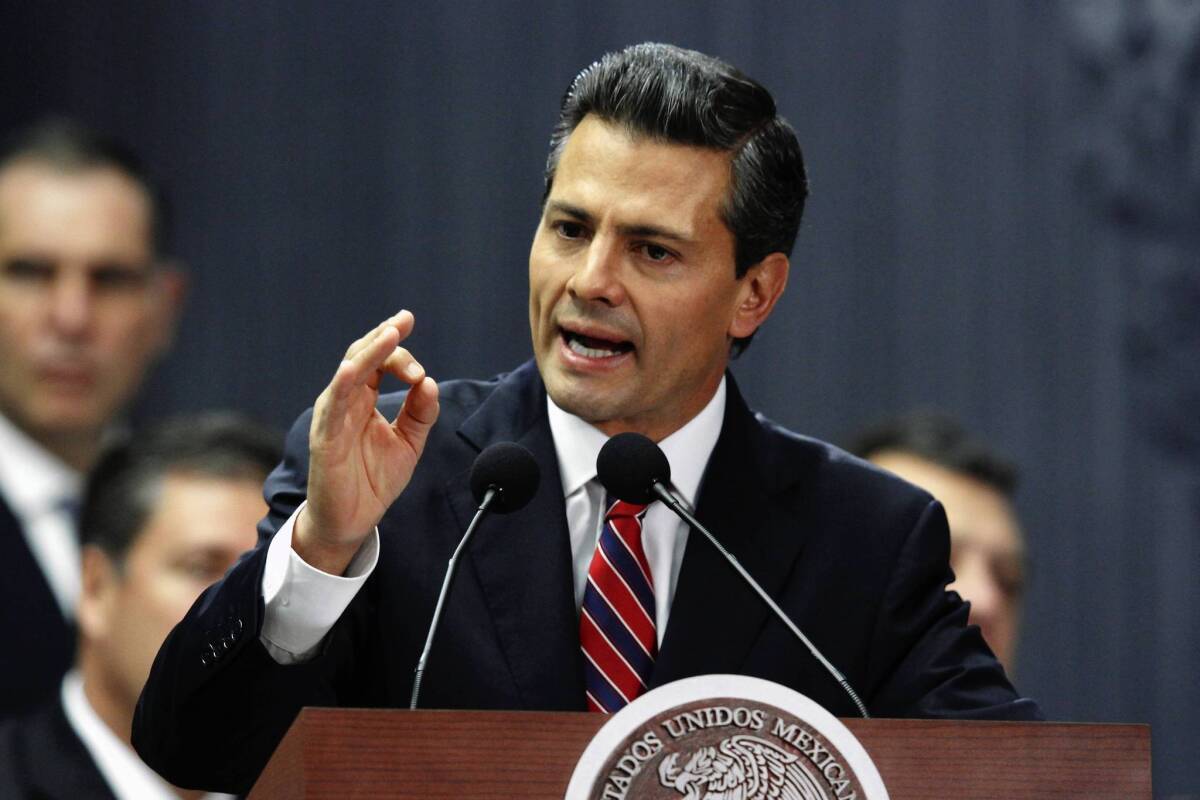Critics say Mexico tax overhaul would hit middle class too hard

- Share via
MEXICO CITY — Ricardo Rodriguez Borja works in a New Age gift store in Polanco, one of Mexico City’s wealthiest neighborhoods, and he readily concedes that its tarot card decks, angel statues and books on chakra energies are luxuries in a country where 45% of residents live in poverty.
The 32-year-old predicts he’ll be making fewer sales if President Enrique Peña Nieto’s fiscal reform proposal is approved, because of the added tax burden it will place on his middle-class customers. Rodriguez figures he’ll be affected personally as well, forced to pay additional taxes on rent, entertainment and bus trips out of town.
“It’s a chain-reaction effect,” he said Tuesday. “I’ll make less, and have less to spend at other businesses.”
Peña Nieto’s plan, unveiled Sunday, seeks to raise more revenue in a country that has the lowest tax-collection rate of any of the 34 nations in the Organization for Economic Cooperation and Development. The president sought to avoid the wrath of the Mexican left by leaving out, apparently at the eleventh hour, a value-added sales tax on food and medicine.
But critics on both the left and the right say the plan piles too much of the tax burden on the middle class.
“We are concerned,” said Juan Pablo Castañon, president of the Employers Confederation of the Mexican Republic, a leading business group. The headline writers for the website of Proceso, the muckraking leftist magazine, were less polite, calling Peña Nieto the “hangman of the middle class.”
The proposal would raise the top income tax rate from 30% to 32% for workers earning about $38,000 per year, and impose new taxes on a number of everyday expenses, including private school tuition, pet food, plane trips, gas and soft drinks. The newspaper Reforma on Tuesday calculated that someone with two children and a pet could see expenses jump by about $260 a month.
“There’s no question there’s a [significant] burden on the middle class,” said Fred Barrett, a tax partner at PricewaterhouseCoopers in Mexico City.
The Mexican legislature is set to consider Peña Nieto’s proposal at a time when the country’s economy is experiencing sluggish growth, and as observers in and out of Mexico spar over whether the country has transformed from a largely poor to a “middle class” one, an argument that affects not only the national identity, but also national policy priorities.
A report this year by Mexico’s National Institute of Statistics and Geography suggested that the country was both, with 59% of Mexicans categorized as “lower class” and 39% of them “middle class.” (About 2% of the population was determined to be “upper class.”) The institute found that the middle class grew by about 4% from 2000 to 2010.
Barrett said the president’s plan would hammer the middle class in more indirect ways by scaling back tax exemptions for home sellers, companies that offer healthcare and other benefits to employees, and the border-region factories known as maquiladoras. “Who do you think runs the maquiladoras?” Barrett said. “The middle classes.”
He said the president’s proposal could have done more to tackle the problem of the so-called informal economy — those businesses outside the purview of government, such as some taco vendors, maids and multi-employee small businesses — which comprises nearly 6 in 10 Mexican workers. Among other things, the president is hoping workers will be lured into the formal economy by the promise of qualifying for social security benefits.
Rodriguez said he didn’t understand why the president didn’t propose placing an additional tax burden on Mexico’s rarefied caste of millionaires and billionaires. The existence of a “Mexican middle class,” he said, is akin to how some view angels and chakras.
“It’s a myth,” Rodriguez said. “In Mexico, it’s just the upper class and the rest of us.”
Sanchez is a news assistant in The Times’ Mexico City bureau.
More to Read
Sign up for Essential California
The most important California stories and recommendations in your inbox every morning.
You may occasionally receive promotional content from the Los Angeles Times.










